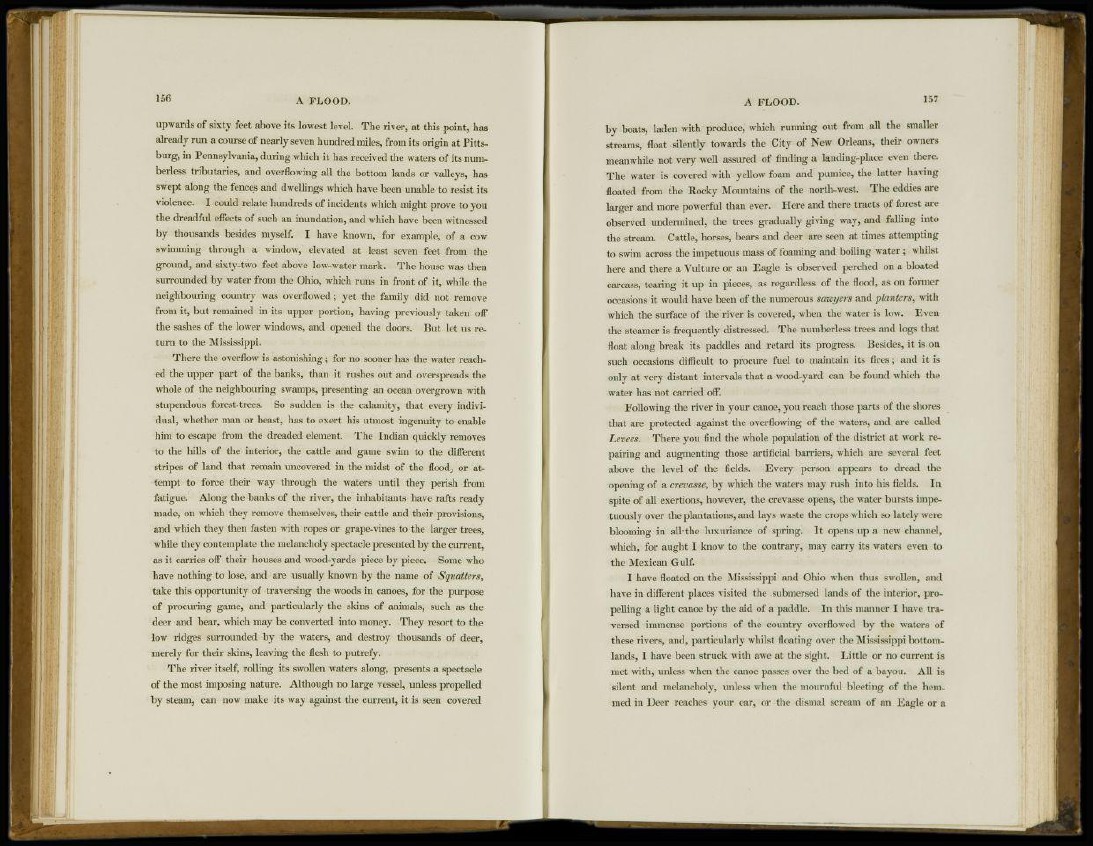
upwards of sixty feet above its lowest level. The river, at this point, has
already run a course of nearly seven hundred miles, from its origin at Pittsburg,
in Pennsylvania, during which it has received the waters of its numberless
tributaries, and overflowing all the bottom lands or valleys, has
swept along the fences and dwellings which have been unable to resist its
violence. I could relate hundreds of incidents which might prove to you
the dreadful effects of such an inundation, and which have been witnessed
by thousands besides myself. I have known, for example, of a cow
swimming through a window, elevated at least seven feet from the
ground, and sixty-two feet above low-water mark. The house was then
surrounded by water from the Ohio, which runs in front of it, while the
neighbouring country was overflowed; yet the family did not remove
from it, but remained in its upper portion, having previously taken off
the sashes of the lower windows, and opened the doors. But let us return
to the Mississippi.
There the overflow is astonishing; for no sooner has the water reached
the upper part of the banks, than it rushes out and overspreads the
whole of the neighbouring swamps, presenting an ocean overgrown with
stupendous forest-trees. So sudden is the calamity, that every individual,
whether man or beast, has to exert his utmost ingenuity to enable
him to escape from the dreaded element. The Indian quickly removes
to the hills of the interior, the cattle and game swim to the different
stripes of land that remain uncovered in the midst of the flood; or attempt
to force their way through the waters until they perish from
fatigue. Along the banks of the river, the inhabitants have rafts ready
made, on which they remove themselves, their cattle and their provisions,
and which they then fasten with ropes or grape-vines to the larger trees,
while they contemplate the melancholy spectacle presented by the current,
as it carries off their houses and wood-yards piece by piece. Some who
have nothing to lose, and are usually known by the name of Squatters,
take this opportunity of traversing the woods in canoes, for the purpose
of procuring game, and particularly the skins of animals, such as the
deer and bear, which may be converted into money. They resort to the
low ridges surrounded by the waters, and destroy thousands of deer,
merely for their skins, leaving the flesh to putrefy.
The river itself, rolling its swollen waters along, presents a spectacle
of the most imposing nature. Although no large vessel, unless propelled
by steam, can now make its way against the current, it is seen covered
by boats, laden with produce, which running out from all the smaller
streams, float silently towards the City of New Orleans, their owners
meanwhile not very well assured of finding a landing-place even there.
The water is covered with yellow foam and pumice, the latter having
floated from the Rocky Mountains of the north-west. The eddies are
larger and more powerful than ever. Here and there tracts of forest are
observed undermined, the trees gradually giving way, and falling into
the stream. Cattle, horses, bears and deer are seen at times attempting
to swim across the impetuous mass of foaming and boiling water ; whilst
here and there a Vulture or an Eagle is observed perched on a bloated
carcass, tearing it up in pieces, as regardless of the flood, as on former
occasions it would have been of the numerous sawyers and planters, with
which the surface of the river is covered, when the water is low. Even
the steamer is frequently distressed. The numberless trees and logs that
float along break its paddles and retard its progress. Besides, it is on
such occasions difficult to procure fuel to maintain its fires; and it is
only at very distant intervals that a wood-yard can be found which the
water has not carried off.
Following the river in your canoe, you reach those parts of the shores
that are protected against the overflowing of the waters, and are called
Levees. There you find the whole population of the district at work repairing
and augmenting those artificial barriers, which are several feet
above the level of the fields. Every person appears to dread the
opening of a crevasse, by which the waters may rush into his fields. In
spite of all exertions, however, the crevasse opens, the water bursts impetuously
over the plantations, and lays waste the crops which so lately were
blooming in all-the luxuriance of spring. It opens up a new channel,
which, for aught I know to the contrary, may carry its waters even to
the Mexican Gulf.
I have floated on the Mississippi and Ohio when thus swollen, and
have in different places visited the submersed lands of the interior, propelling
a light canoe by the aid of a paddle. In this maimer I have traversed
immense portions of the country overflowed by the waters of
these rivers, and, particularly whilst floating over the Mississippi bottomlands,
I have been struck with awe at the sight. Little or no current is
met with, unless when the canoe passes over the bed of a bayou. All is
silent and melancholy, unless when the mournful Meeting of the hemmed
in Deer reaches your ear, or the dismal scream of an Eagle or a